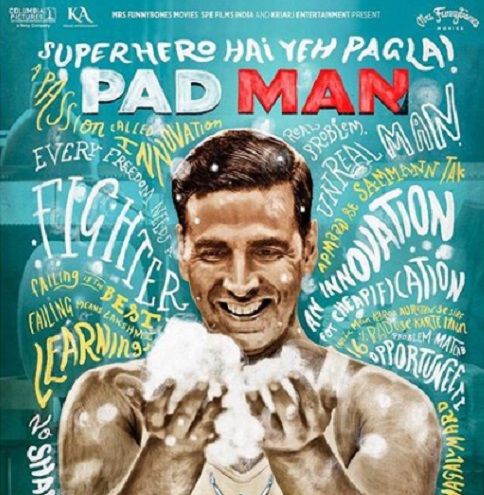R Balki‘s Pad Man is an important film. In a country where even in 2018, women are seen as ‘polluted’ during their period (which are already painful), a superstar wearing a pad and talking about ‘chums’ is a bold move. Based on Twinkle Khanna‘s short story on Arunachalam Muruganantham – the inventor of a low-cost sanitary pad-making machines, which revolutionized the way rural India feels about menstruation, Pad Man is an entertaining and insightful watch. The Tamil Nadu native has been credited for creating awareness about the unhygienic practices around menstruation in rural India. Akshay Kumar plays his fictionalized version – Lakshmikant Chauhan, a hardworking, intelligent and innovative man from Madhya Pradesh, who is a cut above the rest.
Lakshmi is the perfect husband, the perfect employee and the perfect innovator. It’s his quest for perfection that makes him who he is. But it’s also the reason why he is shamed in public, separated from his wife and ostracized by his village. Lakshmi is a logical man, you can see that in a scene where the villagers are fascinated by a Hanuman statue that crushes an entire coconut when inserted into his mouth, but Lakshmi is just slightly amused because he has figured out the science behind it. Besotted by his wife Gayatri (Radhika Apte), Lakshmi is horrified when he finds out that she (and all the women in his family village) uses a dirty piece of rag to prevent staining during her period. He decides that he will do anything he can to make her life easier so that she doesn’t have to use such an unhygienic product around her privates.
He starts by buying Gayatri a pack of sanitary napkins (which costs Rs. 55). Easily one of the funniest scenes in the movie, the store owner stealthily hands him over the packet which has been wrapped in paper, to which Lakshmi quips ‘gaanja de rahe ho kya?’. As the women around him giggle, the shopkeeper tells him to keep it quiet as there are women around, to which he remarks that ‘parr woh hi toh pehenti hai!’. The secrecy in which sanitary napkins are sold understandably baffles him. The high price of basic sanitary napkins (and Gayatri’s reaction that they will have to stop buying milk and ghee if they buy this every month) drives Lakshmi to create a cheaper version with the same ingredients. His obsession with making the perfect pad, sneaking up on women and asking them to use his product disgusts everyone, including his wife. Gayatri is perpetually shocked and angry at her husband, who is trying to make people acknowledge that menstruation is natural and measures to make a woman’s life easier during that time is important.
Lakshmi works like a man possessed to create machines which will make sanitary pads at quarter the cost of the market price. He’s undoubtedly a good engineer, but his PR skills need a lot of brushing up. That’s when a young and intelligent MBA from Delhi, who is also a competent tabla player, enters his life. Her name is Pari (Sonam Kapoor) and they’re as different as chalk and cheese, but their shared interests in helping people constantly pulls them together, sometimes a bit too close. With the help of Pari, who women don’t shy away from when she approaches them with Lakshmi’s products (sisterhood), Lakshmi reaches the position where he is invited by the United Nations to deliver a lecture. In his broken English (which is he calls Linglish – Lakshmi’s English) he manages to charm the audience with his simple message on the importance of women empowerment.
Akshay Kumar is earnest and solid as the bull-headed but sensitive Lakshmi, who cannot fathom how people around him don’t see how dangerous menstruation can be if hygienic products are not used. Even in scenes where he could have applied typical Bollywood-ish histrionics, Akshay has played it subtle. His speech in the film’s climax (similar to the one which made Arunachalam into a viral sensation) is hilarious, sweet and heartwarming. Sonam makes the most of her character, which is basically an extended cameo. She stands out particularly in a scene where Lakshmi is telling her about ‘abhishaap‘ and her reaction to it ‘abhi-whaa?’. Radhikais fabulous as Gayatri – the flustered, embarrassed but also supportive wife who just can’t wrap her head around her husband’s fascination with something that’s seen as a ‘woman’s problem’. She doesn’t even need a lot of dialogues, those eyes are enough to emote everything she’s feeling, from love – to embarrassment – to shame.
R Balki has done a great job with handling a movie that could (sadly) put a lot of people off because of its subject matter. Amit Trivedi‘s music is brilliant with Aaj Se Teri especially standing out. P.C. Sreeram‘s cinematography is strong and Chandan Arora‘s editing doesn’t allow the movie to lag. There are some problems of course, like the seemingly instant solutions that just pop up at Lakshmi’s convenience, the repeated scenes of women from Lakshmi’s house and village getting mad at him for trying to make them use sanitary napkins and the constant voice-overs which try to explain what exactly our protagonist is feeling at that particular moment. It gets a bit much at times, but overall, Pad Man is an enjoyable watch. In his speech at the UN, Lakshmi says that if men bleed for half an hour as much as women do, they will die, Pad Man successfully drives this point home. Now, I just hope the sequel has Lakshmi discovering a cure for PMS and we’re sorted.

